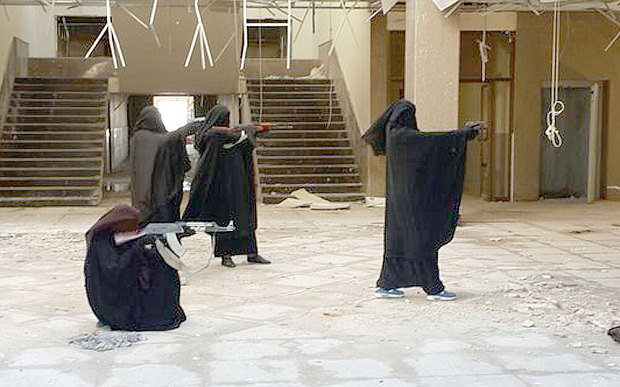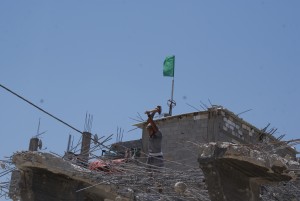ISIS’s war on women in Mosul
By Thurayya Ibrahim*
Before ISIS began targeting Iraq's minorities and cultural heritage, it set to work veiling women in a new dark age, reversing decades of hard-won gains.

Tuesday 24 February 2015
When I was growing up, the women of Mosul had the freedom to pursue whatever path they chose to follow. They had the right to work, study and dress as they desire. Women were empowered participants in the community. Growing up during the early 1980s in Mosul, I witnessed the freedom women had. Perhaps it was less than in the 1960s and 1970s, but certainly more than the current sorry situation. I was surrounded by female relatives who all worked after completing their university degrees. They drove cars, went out and travelled abroad alone and refused to get married, preferring the single independent lifestyle. Even at home, when I opened my eyes to the world, I saw my mother going to work everyday as a teacher. The stay-at-home woman was an alien concept to me as a child, and I assumed everyone had to go to work.
Mosul, unlike other Iraqi cities, was a blend of conservatism, tradition and modernity, a balance between the fairly modern and free Baghdad and Basra, and the strict and conservative Najaf and Karbala. Nevertheless, in all the years I spent in Mosul, I came across only one woman who wore a headscarf, one of my primary school teachers. I'm not sure whether the absence of the veil was down to Iraq's secular rule or whether it reflected a more confident society not yet torn apart by economic sanctions, wars, occupation and sectarianism – all of which are contributing factors to the social change that began to take place in Mosul even before the ISIS invasion.
During the 1960s and 1970s, women were free to wear trousers, mini-skirts and sleeveless dresses. By the 1980s, this was beginning to change, and Mouslawi society started to be critical of such styles. Not everyone complied with the new conservative mores and some carried on wearing what they wanted but most decided not to become the talk of the town.
Just as the Islamic State (ISIS) has striven to destroy Mosul's heritage and cultural diversity, the group has been working to devastate the position of women. Before the jihadist group began demolishing places of worship and archaeological landmarks, and before they started their campaign of ethnic cleansing, it issued new rules for women to follow, including a repressive dress code. ISIS recently imposed further restrictions on what women are allowed to wear – the new “Law” demands that women wear an almost tent-like cape which covers them from their eyes to their feet. There have even been reports of women falling and fracturing their legs as they struggle to walk in such attire.
Such codified restrictions were alien to a society where the long struggle for female emancipation scored many notable victories. Iraq has always been at the forefront of female emancipation in the Arab world, with a wealth of famous women who have left a mark not only on Iraq's history but on the world stage too. Figures like the writer and traveller Maria Theresa Asmar, who wrote a book in the early 19th century describing her travels through Turkey, Syria, Lebanon, and Palestine. Armenian-Iraqi Beatrice Ohanessian was Iraq's first concert pianist and one of the few women to become a director of the Piano Department at the Institute of Fine Arts in Baghdad. Other prominent Iraqi women include Nazik Al-Malaika, considered by many to be one of the most influential contemporary Iraqi poets who was the first poet to use free verse in Arabic, Zaha Hadid, the renowned international architect, who is in fact originally from Mosul, and many more.
It seems ironic today that Iraq in the 1950s had the first female cabinet minister in the Arab region. This remarkable woman, Naziha al-Dulaimi, was probably one of the most respected and recognised Iraqi women. An early pioneer of the Iraqi feminist movement and co-founder and first president of the Iraqi Women's League, she studied medicine at the Royal College of Medicine in Baghdad and, at the age of 19, she was one of few female students at the Medical College. During her government career, al-Dulaimi was instrumental in turning the vast slums of eastern Baghdad into a massive social housing project and helped author the secular 1959 Civil Affairs Law, which was way ahead of its time in liberalising marriage and inheritance laws to the advantage of Iraqi women. She was also a prominent member of the international feminist movement and an active participant in the Iraqi and world peace movements.
It is hard to imagine how a country that has made such progress can be expected to to return the dark ages where women who do not meet ISIS's requirements are often sold into slavery or forced to marry one of its fighters. The rest of the women who are not targeted for sexual/slave trade are segregated from men in all aspects of daily life.
Anyone who contravenes ISIS's draconian rules faces heavy repercussions, but some locals are defiant, despite the risks. One friend witnessed a so-called “hisbah” patrol stop a woman who was with her husband because she was not wearing the “right” clothes. Within minutes, an ISIS member raised his baton to strike the woman when, in a fit of rage, the husband shouted: “In ten years of marriage, I have never lifted a finger against my wife. Do you think I will allow a fanatical foreigner to degrade and hit her?” The man my friend witnessed wrestled the baton out of the patrolman's hand and started beating him with it.
To avoid such situations, many women have opted to stay at home and not venture outside or go to work. But not everyone can afford this luxury, especially with the soaring cost of living. Even girls as young as 11 cannot escape these draconian rules. Fearing for their daughters' safety, many families have kept girls home from their schools and universities. One mother had no choice but to stop her 14-year-old daughter from attending school after an ISIS patrol stopped the chauffer-driven car that was taking the girl and her younger brother to their school demanding to know why the girl's eyes were not covered. Apparently, the fact that her entire face was veiled was not enough. When the ISIS militant started to question the girl as to why she was out with “strange men”, the driver explained that the young boy was her brother, which provoked the patrol to ask who the chauffer was. By this point, the girl was so scared that she lied and said he was her uncle. The girl was so frightened that she told her mother she never wanted to leave the house again, even though she had been defying her parents to pursue her education despite the ISIS presence.
ISIS members have also prohibited female students from attending classes because their attire was considered “un-Islamic”. The only accepted attire for female students is the one-piece black burqa. And it is not just girls who are dropping out in large numbers. Boys reportedly are too.
It should be pointed out that there is significant local divergence within Mosul, in terms of rules, and how strictly or leniently they are applied, which often depends on the ISIS militants in the area. “I witnessed several women in the market areas without niqabs,” one local said. “[This] appears to be a change in strategy following a number of attacks perpetrated by disguised men in niqab.”
Iraqis, particularly women, are resilient and adaptable. Iraqi womenhad to endure years of wars without a man in the house, as often they were on the battlefield and many never came back. Women also had to improvise throughout the long years of sanctions to ensure their children and loved ones got fed. With the arrival of the US invasion, women faced a new challenge of protecting their family from foreign invaders. Similarly, despite all the atrocities and savage acts ISIS commits, people try to get on with life in Mosul. Women still go out – provided they are covered from head to toe – they drive to work (though at work they are segregated from men) visit each other and go to the shops. Beauty parlours and hair salons have been banned, and various cosmetic and hair products are no longer sold in shops, driving women to find alternatives when caring for their appearance. Despite the restrictions, three weddings took place last month, two of which were hosted by my old neighbours in Mosul. And that is the contradictory nature of the city, while some women are fleeing, others are being defiantly normal.
There have been reports of public executions of women, notably ones who were politically active. For example, two former candidates for the Iraqi parliament – Ibtisam Ali Jarjis on the Watanya list and Miran Ghazi, who was a candidate for Arab List – were sentenced to death by ISIS's Sharia court.
According to officials from Mosul, the two candidates had repented in one of the ISIS mosques in Mosul to spare their lives, but the Islamic judge overruled their repentance and the two women were re-arrested. Isis militants also publicly executed Samira Salih al-Nuaimi, a leading lawyer and human rights activist, after she was seized from her home for allegedly “abandoning Islam”, whereas in actual fact her kidnapping took place after she had posted messages on Facebook that were critical of the militants' destruction of religious sites in Mosul. The militants then tortured al-Nuaimi for five days before killing her. Al-Nuaimi left behind a husband and three children. There are many more tales of women being publicly executed, such as the three female doctors who refused to treat ISIS militants. ISIS militants recently paraded two sisters and a man who were accused of adultery before stoning them to death.
Life under ISIS for the women of Mosul is unprecedented in Iraq's modern history. But tough, patient and resilient as they are, these women will continue to resist.
Part I: The ISIS disease in Mosul
Part II: Mosul's lost diversity
Part III: The destruction of Mosul's past, present and future
____
* The author's name is a pseudonym.

